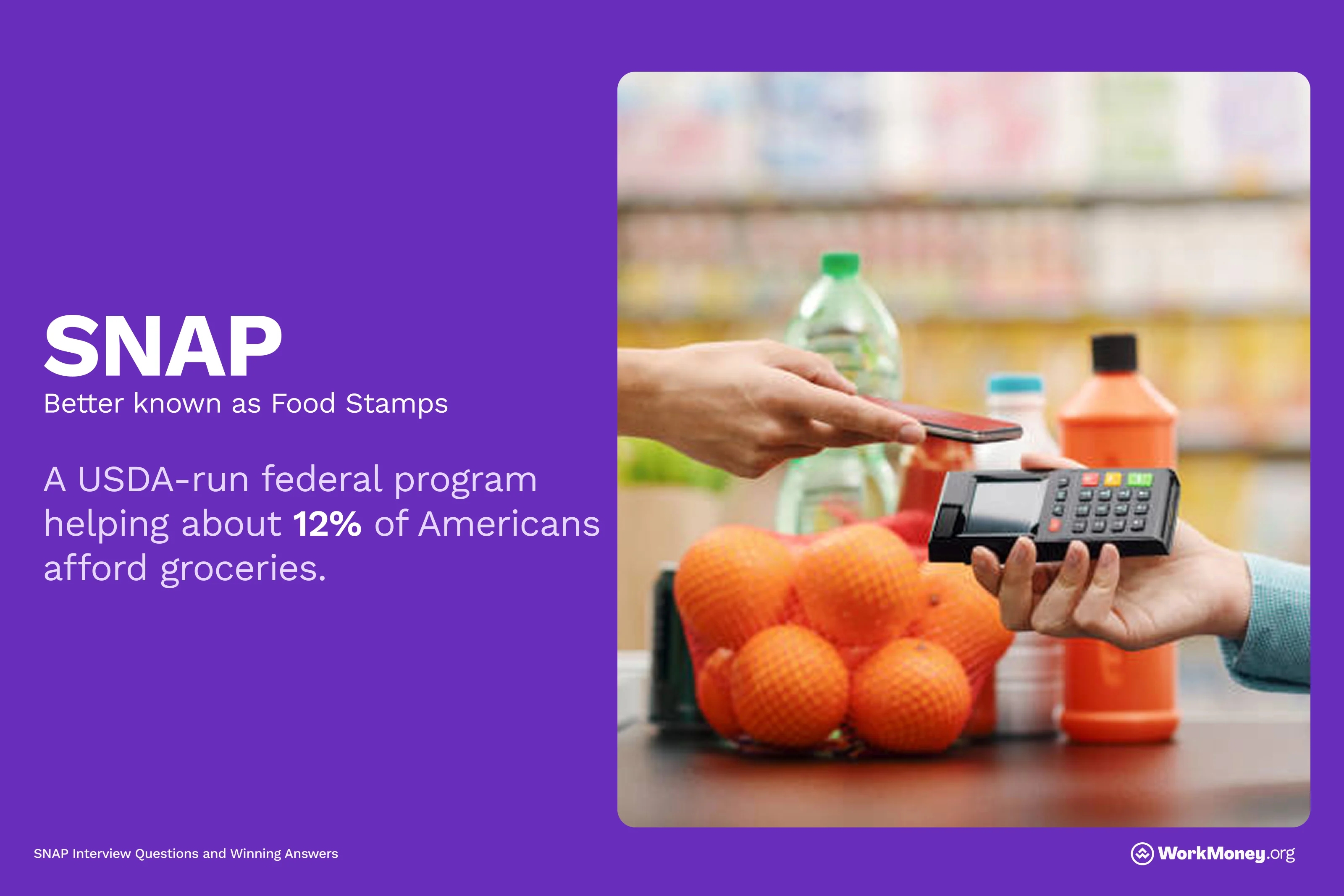SNAP Interview Questions and Winning Answers
Get ready for your SNAP interview with example questions, answers, and a checklist to help you qualify with confidence.

The Supplemental Nutrition Assistance Program (SNAP) is a federal program run by the U.S. Department of Agriculture (USDA). This benefit helps American families get the funding they need to purchase groceries. This benefit is used by roughly 12% of the American population, and the average benefit per household member is just under $200 per month.
There are a few steps you have to go through in order to receive benefits. Once you determine your eligibility and apply, the next step is an interview with a caseworker. The interview is simply to confirm your information and ensure you’re eligible.
Here’s more information about the interview itself, and the SNAP interview questions you may be asked.

What Is the SNAP Interview?
After you apply for benefits, you will be contacted to schedule an interview for SNAP benefits. The SNAP interview is either an in-person or over-the-phone interview where a caseworker reviews your information and verifies next steps to get you the benefits you applied for.
Each state handles its interviews differently, so be sure to confirm whether you need to go in person or not.
If the need is more urgent, you may be able to request an expedited interview. You can find the qualifications for that here.
If you’re approved for benefits, consider signing up for Propel where you can keep track of your current EBT balance.
What to Bring or Prepare
You will need proof of identity, income, and your bills to prove both your identity and need. So before your interview, grab these documents ahead of time:
Category | Examples of Documents |
|---|---|
1. Proof of Identity | - Driver’s license or state ID - Birth certificate - Passport or other government-issued ID |
2. Social Security Numbers | - Social Security cards - Official documents with SSNs for all household members |
3. Proof of Residency | - Recent utility bill (electric, gas, water) - Lease or rental agreement - Official mail from a government agency |
4. Proof of Income (last 30 days) | - Pay stubs - Employer letter verifying wages - Social Security, unemployment, or other benefit award letters - Child support received - Self-employment income and expenses (if applicable) |
5. Proof of Expenses | - Rent or mortgage receipts - Utility bills - Child care costs - Medical expenses (if 60 or older or disabled) |
6. Proof of Assets (if applicable) | - Recent bank statements - Statements for retirement or investment accounts |
7. Immigration Status (if not a U.S. citizen) | - Green card or immigration documents - Work authorization or refugee/asylee documents |
Common SNAP Interview Questions and Winning Answers
It’s important to know that the caseworker interviewing you is not trying to trick you. They have a series of questions they need to get answers to to ensure you’re eligible. Here are some sample questions they may ask, and straightforward ways you can answer.
Question: Can you confirm everyone who lives in your household?
Answer Example: “Yes, I live with my sister and her two kids. We all share groceries and meals.”
Be sure to include everyone who purchases and prepares food with you, even if they aren't related to you.
Question: What is your total monthly income?
Answer Example: “I work part-time at a daycare and make about $X a month. I have my last two paystubs to provide. Or if you have irregular income, you may say: “"I work as a gig worker, so my income isn't consistent. Some weeks I might get a few jobs and earn more, but other weeks I might not get any. It really depends on demand and availability."
Be honest and provide pay stubs or documentation.
Question: Do you pay for housing or utilities?
Answer Example: “Yes, I pay $700 for rent and about $120 monthly for electricity and water.” The key here is to include all of your shelter costs, not just your rent. All of the costs of your housing should be included as it can affect how much in assistance you qualify for.
This helps determine deductions, which can increase your benefits. Be sure to include rent, electricity, water, internet, etc.
Question: Do you or anyone in your household have medical expenses?
Answer Example: “My mother has Medicare premiums and regular prescriptions. We spend about $150 monthly.”
Medical deductions may improve your eligibility. Be sure to include prescriptions, doctor visits, and insurance premiums.
Question: Have you received SNAP or other benefits before?
Answer Example: “Yes, I received SNAP when I was unemployed last year. I’ve included my past case number.”
It can be tempting not to disclose other benefits you may have received in the past, but it’s always best to be honest.
WorkMoney Tip: The caseworker may ask a question you won’t have the answer to, and that’s okay. Be sure to say something like, “I’m not sure, I can get back to you on that.”
What Happens After Your SNAP Interview?
After your interview is over, the caseworker is going to ensure that the information you provided in the interview matches your application info. You will receive notice of if you’re approved in writing or by email, depending on your state.
If you’re approved, you should receive a physical EBT (electronic benefit transfer) card in the mail. When you pay for groceries, whether in person or through a delivery service like Instacart, you will use the EBT card as payment.
Final Thoughts
To be extra prepared for your interview, prepare a list of questions for the caseworker. This process can be stressful and confusing, so use the caseworker as a resource for all of your questions.
Interviews can feel intimidating, especially for something as important as financial aid. But as long as you meet the qualifications, you stand a good chance of getting the assistance you need.
About the Author

Brett Holzhauer
Brett Holzhauer is a Certified Personal Finance Counselor (CPFC) who has reported for outlets like CNBC Select, Forbes Advisor, LendingTree, UpgradedPoints, MoneyGeek and more throughout his career. He is an alum of the Walter Cronkite School of Journalism at Arizona State. When he is not reporting, Brett is likely watching college football or traveling.

